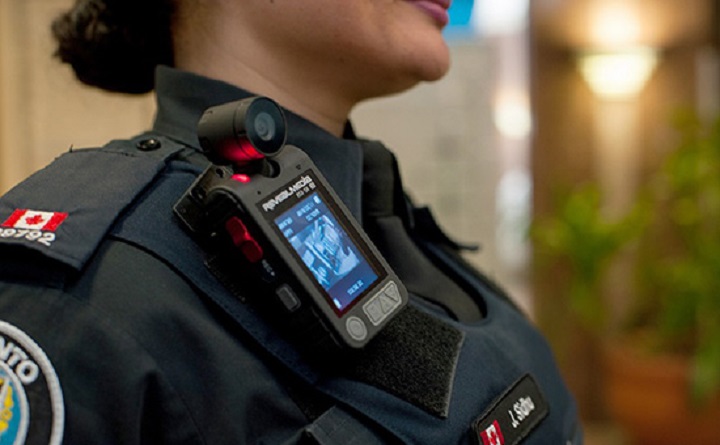Toronto police are asking for approval to outfit all frontline officers with body-worn cameras, despite reporting major issues after analyzing its year-long pilot project.

The request to the police board comes despite the steep cost of the proposed program, which the report estimates would reach $85 million over 10 years.
The vast majority of that money would go to storing the videos, according to Insp. Michael Barsky, the operational lead on the pilot project.
READ MORE: Toronto police begin review of body-worn cameras after pilot project ends
Both Mayor John Tory and Chief Mark Saunders said one of the main concerns was the amount of time officers spent dealing with the videos after their shifts – an average of 39 minutes and up to two hours per shift for some officers.
“This is clearly a major, major devotion of police resources to just managing video information and unless you spent a lot more money on a lot more police officers this is going to take away from policing in the community,” Tory said.
“So these are the kinds of things we’re going to have to take a very careful look at, but I am in favour of having cameras subject to resolving a lot of these issues.”
READ MORE: 5 things to know about Toronto police body-worn cameras

Get daily National news
Some of those issues include serious battery problems that only allowed use of the cameras for three-to-five hours per shift and the majority of officers work 10-hour shifts, Barsky said.
There was also hope that the body cameras would have a positive effect on police officers by decreasing use-of-force incidents, but there was little effect, according to the report.
But it noted officers surveyed said they felt they lost their use of discretion, which led to an increase in arrests and a decrease in warnings.
Saunders said technology has changed so quickly since they began looking into body cameras two years ago that many of these problems could be resolved.
READ MORE: Canada’s privacy watchdogs flag concerns over police body cameras
“I think at the end of the day when we take the time necessary to get the right product that will give us the best results, I think it’s going to be a win not just for law enforcement but the public as well,” Saunders said.
Police forces have two general options for data storage: a cloud-based server hosted by a third party, usually off site, or local storage – essentially giant hard drives that police forces own and operate themselves.
Toronto police used their own hard drives, which is the single biggest cost in the program, Barsky said.
The force, he said, opted for in-house storage because it wanted complete control over data for security reasons. There were also concerns that the U.S. Patriot Act allows American authorities to access data that is stored in their country.
Despite the negatives, Barsky said it provides police with the best possible evidence that can be used in court.
Surveys conducted by Toronto police showed 95 per cent of the public and 85 per cent of officers support the use of the cameras.
Tory said he was disappointed the board didn’t receive the report until an hour before the meeting, so it will be discussed more completely at a meeting next month.
Forces across the country are grappling with body cameras.
What happens in Toronto could determine the situation in the rest of the province.
Ontario’s police forces – save for a small force in Amherstburg that has already outfitted all 16 of its frontline officers with cameras – are watching Toronto following a directive from the Ontario Association of Chiefs of Police, which is supported by the Ministry of the Attorney General, Barsky previously told The Canadian Press.
In Calgary, police had begun rolling out cameras to its front line officers after purchasing 1,100 cameras from a Utah-based company. But they had to test 150 cameras after discovering a problem with the built-in microphone.
In Vancouver, police have opted out of the body camera game for now, citing the high cost of storage as a significant barrier.
Montreal police are currently undergoing their own pilot project for two dozen officers to examine its potential use.







Comments